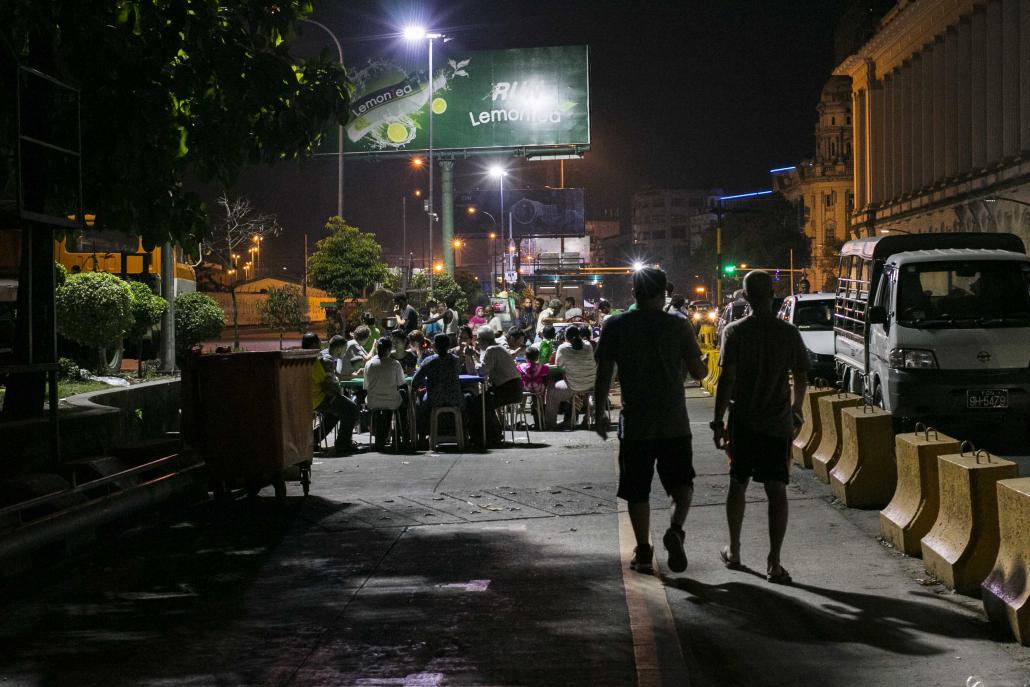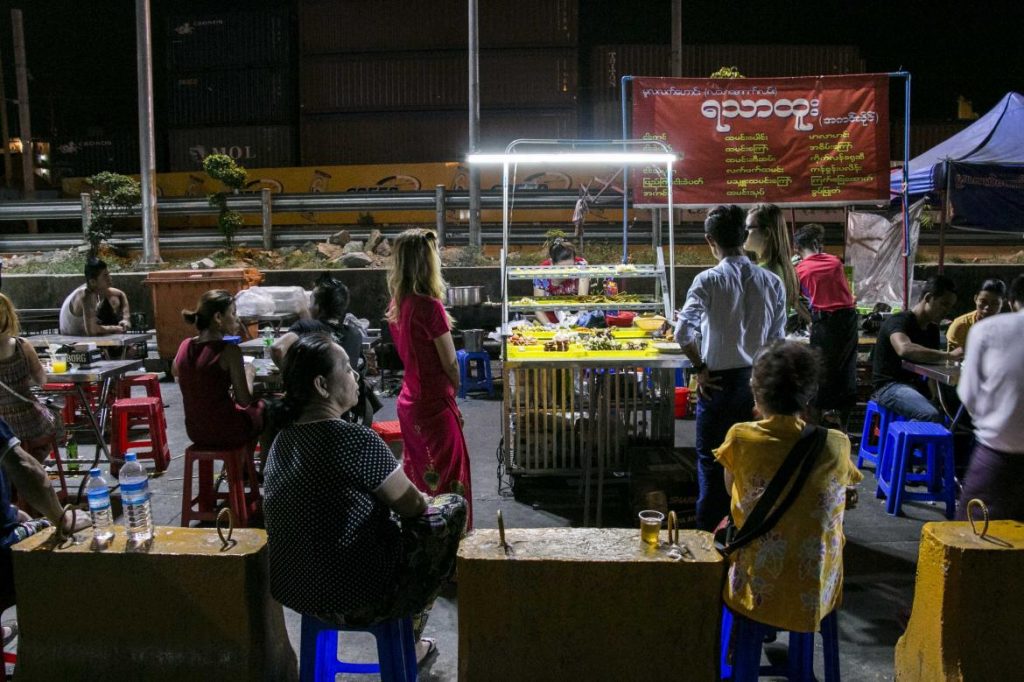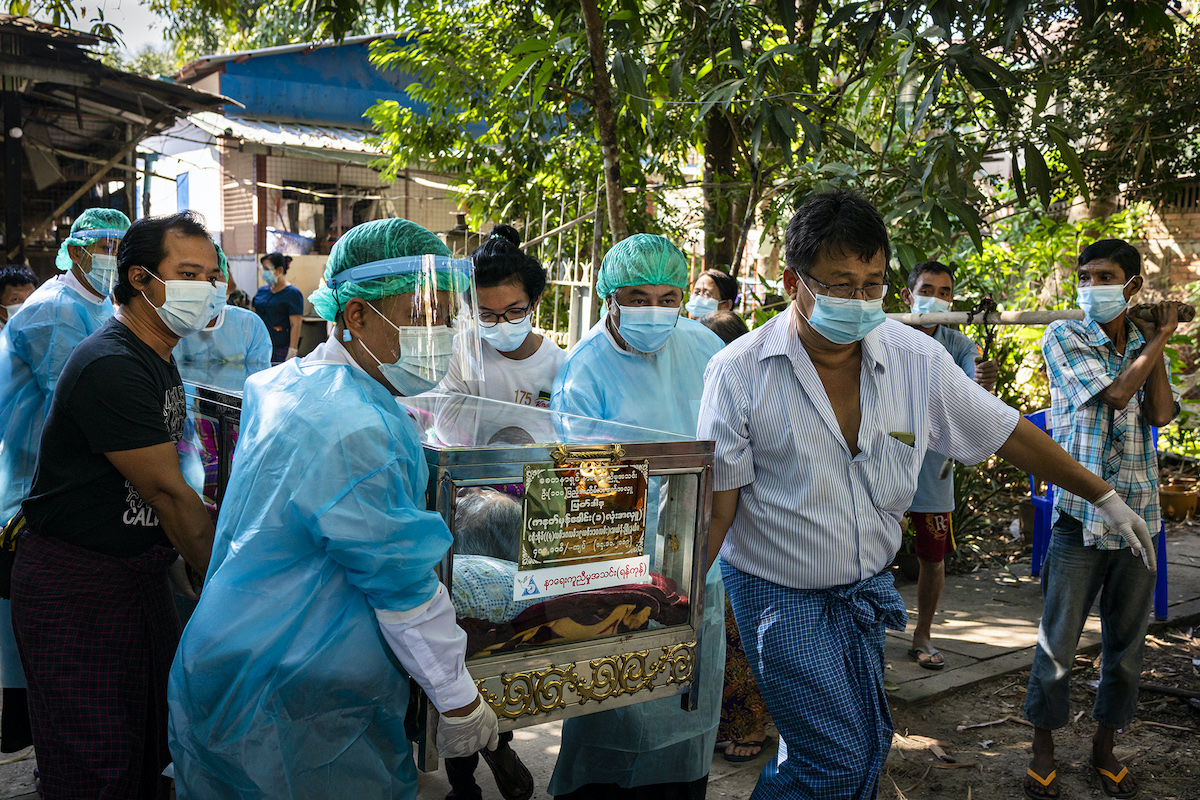Showers of rain since late April have further dampened the mood of the diminishing number of vendors trying to make a living at the Strand Road night market since they were relocated from elsewhere in the downtown area last November.
By SU MYAT MON | FRONTIER
WET WEATHER since the end of April has added to the hardship and disappointment of vendors forced to relocate to the Strand Road night market last November under a plan aimed at easing congestion in downtown Yangon.
The night market, along Strand Road between Pansodan Road and the edge of Lanmadaw Township, near Thakhin Mya Park, is open daily between 3pm and 11pm. Its busiest sections are close to Naungpinlay market in Lanmadaw Township and Chinatown in neighbouring Latha Township, both of which bustle with shoppers.
Of about 4,000 street vendors in the downtown area, 1,600 were allocated spaces at the market, but just one-third are operating at the site because of the poor facilities and lack of customers. Those continuing to operate are doing so because they see little alternative.
“Despite facing difficulties, I have no choice but to stay here because I have children studying at university,” Daw Lay Khin Khin, 40, told Frontier as she set up the stall where she sells Shan food. “What else can I do apart from this?” she added.
nswks-4.jpg
Support more independent journalism like this. Sign up to be a Frontier member.

Customers and vendors at the night market on Strand Road in Yangon on May 16. (Nyein Su Wai Kyaw Soe | Frontier)
Lay Khin Khin was one of only three vendors setting up stalls along a 15-metre (50 feet) section of the market in front of Myanmar Economic Bank late on the afternoon of April 30.
Before the rain came that morning she had stocked up on fresh ingredients for her stall’s dishes.
“After the rain came I had to set up my stall otherwise the ingredients would rot,” she said.
Lay Khin Khin lives in inner eastern Pazundaung Township with a son and daughter, and her father-in-law, all of whom help her run the stall.
She told Frontier she had invested K3 million (US$2,200) to set up her stall at the night market but after seven tough months is yet to even turn a profit, let alone earn back what she has spent.
“I had to buy a light truck for transportation so I can store goods for the shop at home,” she said, adding that she hoped the authorities would make the vendors’ lives easier by providing a storage facility at the market where their goods could be protected from the weather.
“This is a windy location and the umbrellas we use to shelter our stalls don’t offer much protection when the wind and the rain comes,” Lay Khin Khin said.
“I’m still deciding whether I want to continue running my shop,” she said. “If it gets worse, I will have to close it because no one can tolerate a situation like this.”
Another stall-holder considering whether to call it quits at the night market is U Pyi Thein, 36, from Dala Township across the Yangon River, who previously sold wet-thar dote htoe (boiled pork offal) on 17th Street, a popular destination for residents and tourists.
“I am thinking of shifting to another job; I can’t stand being like this because I have children to send to school,” said Pyi Thein, who now sells soft drinks at the night market.
In common with most remaining vendors at the market, he is worried about the onset of the rainy season in the coming weeks, when they say Strand Road is affected by flooding, particularly around the full moon when the tide is at its highest.
“There was a high tide last week and we had to wait until it receded before we could set up our stalls,” Pyi Thein told Frontier on April 30.
The government should visit the market to see the conditions vendors have to endure, said Pyi Thein, who backed Lay Khin Khin’s call for storage facilities at the site. “It would be good if the government helps us to be able to store goods here during the rainy season, otherwise we will be in trouble,” he said.
dsc_2026.jpg

Flooding brought on by rainy season has added to the problems for the vendors, who have been relocated from other parts of downtown since November. (Steve Tickner | Frontier)
Yangon Region MP Daw Kyi Pyar (National League for Democracy, Kyauktada-1) said the implementation of the night market, planned by the previous Union Solidarity and Development Party government and managed by the Yangon City Development Committee, was badly organised and rushed.
“Because of this, since the market started it has not been satisfactory – there have been lots of problems,” she said.
Lawmakers were not given any opportunity to participate in planning the night market, she said, adding that when they received information about the move it was too late to propose changes.
“We were informed once they finished the planning,” she said.
Even then, the government did not clearly outline its intentions, she said. It only told the assembly that it would shift them to a new place “systematically” in order to tackle congestion. “They didn’t tell us that they would just move them all to Strand Road,” she said.
She said because of poor planning the problems could not easily be addressed now. There is also no budget to provide a better location or facilities, she added
“Relocating vendors to along Strand Road caused hardship for them,” the MP acknowledged.
Despite the problems, a YCDC official responsible for the night market, U Maung Maung Htay, said the number of vendors had risen after the Thingyan festival.
About 500 stalls were operating at the market on May 2, he told Frontier.
Asked whether this was correct, Pyi Thein laughed. “It’s true,” he said. “But this was only because on that particular evening, the market was visited by high-ranking officers, so the security officials pressured vendors to open their stalls.”
TOP PHOTO: Nyein Su Wai Kyaw Soe | Frontier







